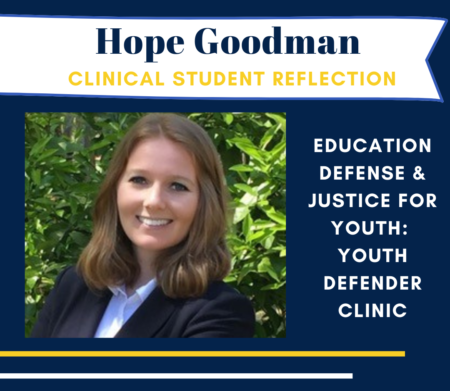
Entering my time with EBCLC, I was aware of the mess that is our nation’s criminal legal system—one designed to perpetuate oppressive harm against people living in poverty and people of color. Through prior coursework and experience serving folks accused of crimes, harmed by crime, and who are incarcerated, I saw the system’s ugliness. It is fueled by criminalizing poverty and funneling Black and brown kids through the school-to-prison pipeline. It obsessively makes money by incarcerating people. It does not care about helping those harmed to heal or about the unmet needs of those accused.
Representing clients in court for the first time with EDJY was a sobering reminder of this unacceptable reality. It was the first time that a client’s case was in my hands and the stakes were high. In delinquency proceedings, young people face an assault on their freedom, their education, their ties with family and community, and their futures. Immediately, I learned how critical it is, as a legal advocate, to both be prepared and to adapt as needed because a young person’s case—and its impact on their wellbeing—can change in just one hearing.
Working with young people through EDJY, and excellent mentors in EBCLC along the way, taught me even more, though. Of course, I honed traditional lawyering skills. But I also discovered what kind of advocate I want to be and what I need to do to become that.
First, I learned to value most my clients’ “expressed interests.” Indeed, I realized that their expressed interests are their best interests because only they can say what is best for their needs and goals. EBCLC’s clients do not live single-issue lives, so I had a duty to holistically tackle their cases. Sometimes, beating the criminal charge matters most; other times, keeping your child or public housing matters most. Whatever the priority, I must fight for it and ensure that my clients feel heard, involved, and supported in making decisions in a near-impossible situation.
Second, I realized that to be an effective advocate, I need to wear many hats. Knowledge in criminal law, evidence, and trial skills is not enough. At times, I’ll need to be a mediator, negotiator, active listener, investigator, or coalition-builder. Equally as important, I’ll need to seek help from others (social workers, psychologists, community leaders) when I do not have the experience or training necessary to meet my clients’ needs. Knowing what hat to wear and when to ask for help matters.
Third, I internalized how the identities I bring—as a white woman likely with few lived experiences in common with my clients—may impact our relationship-building. Rightfully so, many clients may be suspicious of or uncomfortable with me. They may question whether I can authentically advocate for their wishes or whether I am genuinely committed to only them. During client meetings with EDJY, I gained firsthand experience in how difficult it can be to build trust with clients who look different than me and who have had different experiences than me. Experiencing this was necessary, though, because it motivated me to keep trying, learn from my mistakes, and do better. It motivated me to put in the work to better understand my clients and their communities, and to self-reflect on whether my identities (and implicit biases) prevent me from gaining that trust. As a white woman with privilege doing this work, I have much more room to grow; fortunately, EBCLC gave me the insight and tools necessary to do it.
Finally, in working with EBCLC’s radical advocates, I discovered what kind of “justice” system I hope to see. Our nation’s carceral state is unfixable. A system that makes a young person’s life worse in the name of “justice” is unacceptable. Right now, public defenders should embrace community-oriented and participatory defense practices. By utilizing support, knowledge, and resources of impacted communities, they can improve case outcomes and ensure these communities’ wishes have a prominent seat at the table. Looking forward, I hope to see our current system replaced by something that prioritizes healing over punishment. Love over hate. Community over isolation. Understanding over judgment. I hope to see a restorative justice-inspired model that is centered on community, that actually invests resources to improve someone’s circumstances, and that unabashedly acknowledges the devastating role racism, classism, and other -isms play.
Ultimately, my time with EBCLC both reminded me of how harmful our criminal legal system is and gave me hope for a kinder, more equitable future. More importantly, it moved me forward on the life-long journey of becoming a better legal advocate, community member, and human being. I cannot give enough thanks for that.
Written by Hope Goodman
University of California, Berkeley School of Law Class of 2021
East Bay Community Law Center Education Defense & Justice for Youth (EDJY) Youth Defender Clinical Student